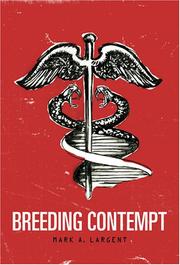| Listing 1 - 8 of 8 |
Sort by
|

ISBN: 1281151424 9786611151423 0813543800 9780813543802 9781281151421 6611151427 9780813541822 0813541824 9780813541839 0813541832 Year: 2007 Publisher: New Brunswick, NJ
Abstract | Keywords | Export | Availability | Bookmark
 Loading...
Loading...Choose an application
- Reference Manager
- EndNote
- RefWorks (Direct export to RefWorks)
Most closely associated with the Nazis and World War II atrocities, eugenics is sometimes described as a government-orchestrated breeding program, other times as a pseudo-science, and often as the first step leading to genocide. Less frequently it is recognized as a movement having links to the United States. But eugenics does have a history in this country, and Mark A. Largent tells that story by exploring one of its most disturbing aspects, the compulsory sterilization of more than 64,000 Americans. The book begins in the mid-nineteenth century, when American medical doctors began advocating the sterilization of citizens they deemed degenerate. By the turn of the twentieth century, physicians, biologists, and social scientists championed the cause, and lawmakers in two-thirds of the United States enacted laws that required the sterilization of various criminals, mental health patients, epileptics, and syphilitics. The movement lasted well into the latter half of the century, and Largent shows how even today the sentiments that motivated coerced sterilization persist as certain public figures advocate compulsory birth control-such as progesterone shots for male criminals or female welfare recipients-based on the same assumptions and motivations that had brought about thousands of coerced sterilizations decades ago.
Eugenics --- Involuntary sterilization --- Castration of criminals and defectives --- Compulsory sterilization --- Eugenic sterilization --- Sterilization, Eugenic --- Sterilization of criminals and defectives --- Involuntary treatment --- Sterilization (Birth control) --- Reproductive rights --- History.

ISBN: 3486645730 348670303X Year: 1996 Publisher: De Gruyter
Abstract | Keywords | Export | Availability | Bookmark
 Loading...
Loading...Choose an application
- Reference Manager
- EndNote
- RefWorks (Direct export to RefWorks)
Karl Bonhoeffer war einer der bedeutendsten deutschen Neurologen und Psychiater des 20. Jahrhunderts. Sein Sohn, der Theologe Dietrich Bonhoeffer, beteiligte sich in seinen letzten Lebensjahren am Widerstand gegen das NS-Regime und wurde 1945 hingerichtet. Uwe Gerrens untersucht, wie der Mediziner und der Theologe auf das nationalsozialistische Programm der Zwangssterilisation und die so genannte Euthanasie reagierten. Anhand der Quellen wird deutlich, wie der Mediziner Karl Bonhoeffer als Vorsitzender des Deutschen Vereins für Psychiatrie und Klinikleiter in der Charité Verantwortung für seine Patienten übernahm und sich an deren Persönlichkeitsrechten orientierte. Der Theologe Dietrich Bonhoeffer setzte sich in einer dicht geschriebenen "Ethik" mit dieser Problematik auseinander und entwickelte eine Theorie der Verantwortungsethik und der Menschenrechte.
Euthanasia --- -Euthanasia --- -Sterilization, Eugenic --- -Castration of criminals and defectives --- Compulsory sterilization --- Eugenic sterilization --- Sterilization, Eugenic --- Sterilization of criminals and defectives --- Involuntary treatment --- Sterilization (Birth control) --- Eugenics --- Reproductive rights --- Assisted death (Euthanasia) --- Assisted dying (Euthanasia) --- Death, Assisted (Euthanasia) --- Death, Mercy --- Dying, Assisted (Euthanasia) --- Killing, Mercy --- Mercy death --- Mercy killing --- Homicide --- Medical ethics --- Assisted suicide --- Right to die --- History --- -20th century --- Moral and ethical aspects --- -History --- -Bonhoeffer, Dietrich --- -Bonhoeffer, Karl --- -Views on eugenic sterilization --- Views on euthanasia --- Views on eugenic sterilization --- Involuntary sterilization --- Moral and ethical aspects. --- Bonhoeffer, Karl, --- Bonhoeffer, Dietrich, --- Ethics. --- Castration of criminals and defectives --- Bonhoeffer, D. --- Бонхёффер, Д. --- Bonkhëffer, D. --- Бонхёффер, Дитрих --- Bonkhëffer, Ditrikh --- Bonhēfers, Dītrihs
Book
ISBN: 9004280340 9789004280342 9789004280335 9004280332 1322223742 Year: 2015 Publisher: Leiden Boston
Abstract | Keywords | Export | Availability | Bookmark
 Loading...
Loading...Choose an application
- Reference Manager
- EndNote
- RefWorks (Direct export to RefWorks)
Human Rights, State Sovereignty and Medical Ethics: Examining Struggles Around Coercive Sterilisation of Romani Women examines the mobilized use by people and groups of the international human rights law framework to move legal, policy and ultimately social change at national and local level. One particular case study is examined in detail: efforts by Romani women in the Czech Republic and Slovakia to secure legal remedy for coercive sterilization. International legal aspects of these cases are examined in detail. The book concludes by endeavouring to answer questions concerning the nature of international law and the evolution of the post-World War II international human rights framework, the structure of national sovereignty, and the potential impact of both on human autonomy.
Race discrimination --- Minorities --- Women, Romani --- Involuntary sterilization --- Castration of criminals and defectives --- Compulsory sterilization --- Eugenic sterilization --- Sterilization, Eugenic --- Sterilization of criminals and defectives --- Involuntary treatment --- Sterilization (Birth control) --- Eugenics --- Reproductive rights --- Romani women --- Women, Gypsy --- Ethnic minorities --- Foreign population --- Minority groups --- Persons --- Assimilation (Sociology) --- Discrimination --- Ethnic relations --- Majorities --- Plebiscite --- Race relations --- Segregation --- Bias, Racial --- Discrimination, Racial --- Race bias --- Racial bias --- Racial discrimination --- Law and legislation --- Legal status, laws, etc. --- Civil rights
Book
ISBN: 1108583199 1108606598 110849949X 1108603009 Year: 2020 Publisher: Cambridge : Cambridge University Press,
Abstract | Keywords | Export | Availability | Bookmark
 Loading...
Loading...Choose an application
- Reference Manager
- EndNote
- RefWorks (Direct export to RefWorks)
Who was the scientific progenitor of eugenic thought? Amir Teicher challenges the preoccupation with Darwin's eugenic legacy by uncovering the extent to which Gregor Mendel's theory of heredity became crucial in the formation - and radicalization - of eugenic ideas. Through a compelling analysis of the entrenchment of genetic thinking in the social and political policies in Germany between 1900 and 1948, Teicher exposes how Mendelian heredity became saturated with cultural meaning, fed racial anxieties, reshaped the ideal of the purification of the German national body and ultimately defined eugenic programs. Drawing on scientific manuscripts and memoirs, bureaucratic correspondence, court records, school notebooks and Hitler's table talk as well as popular plays and films, Social Mendelism presents a new paradigm for understanding links between genetics and racism, and between biological and social thought.
Eugenics --- Mendel's law. --- Involuntary sterilization --- Racism --- Castration of criminals and defectives --- Compulsory sterilization --- Eugenic sterilization --- Sterilization, Eugenic --- Sterilization of criminals and defectives --- Involuntary treatment --- Sterilization (Birth control) --- Reproductive rights --- Breeding --- Variation (Biology) --- Heredity --- Hybridization --- History --- Mendel, Gregor, --- Mendel, Johann Gregor, --- Mendel, Gregor Johann, --- Mendel, Rehor Jan, --- Mendel, J. G. --- Meng-te-erh, --- Influence. --- Germany --- Race relations. --- Politics and government --- Mendel, G. --- Mendel, Gregorius Joannes, --- Mendel, Řehoř Jan,

ISBN: 3531117599 Year: 1986 Volume: 48 Publisher: Opladen Westdeutscher Verl.
Abstract | Keywords | Export | Availability | Bookmark
 Loading...
Loading...Choose an application
- Reference Manager
- EndNote
- RefWorks (Direct export to RefWorks)
Involuntary sterilization --- Eugenics --- Women --- Stérilisation eugénique --- Eugénisme --- Femmes --- History --- Histoire --- -Sterilization, Eugenic --- -National socialism --- Race discrimination --- -Sex discrimination against women --- -#GBIB:CBMER --- Discrimination against women --- Subordination of women --- Women, Discrimination against --- Feminism --- Sex discrimination --- Women's rights --- Male domination (Social structure) --- Bias, Racial --- Discrimination, Racial --- Race bias --- Racial bias --- Racial discrimination --- Discrimination --- Nazism --- Authoritarianism --- Fascism --- Nazis --- Neo-Nazism --- Totalitarianism --- World War, 1939-1945 --- Castration of criminals and defectives --- Compulsory sterilization --- Eugenic sterilization --- Sterilization, Eugenic --- Sterilization of criminals and defectives --- Involuntary treatment --- Sterilization (Birth control) --- Reproductive rights --- Homiculture --- Race improvement --- Euthenics --- Heredity --- -History --- -Causes --- -Eugenics --- Stérilisation eugénique --- Eugénisme --- National socialism --- Sex discrimination against women --- #GBIB:CBMER --- Causes

ISBN: 3525357370 Year: 1987 Volume: 75 Publisher: Göttingen Vandenhoeck und Ruprecht
Abstract | Keywords | Export | Availability | Bookmark
 Loading...
Loading...Choose an application
- Reference Manager
- EndNote
- RefWorks (Direct export to RefWorks)
Eugénisme --- Political Systems. --- Sterilization, Eugenic --- -Medical ethics --- -Biomedical ethics --- Castration of criminals and defectives --- Compulsory sterilization --- Eugenic sterilization --- Sterilization of criminals and defectives --- Involuntary treatment --- Political System --- System, Political --- Systems, Political --- Euthanasia, Involuntary --- Involuntary Euthanasia --- Mercy Killing --- Killings, Mercy --- Mercy Killings --- -Germany. --- Eugénisme --- Euthanasia --- Involuntary sterilization --- Medical ethics --- National socialism --- Political Systems --- Killing, Mercy --- Right to Die --- Suicide, Assisted --- Bioethical Issues --- Nazism --- Authoritarianism --- Fascism --- Nazis --- Neo-Nazism --- Totalitarianism --- World War, 1939-1945 --- Biomedical ethics --- Clinical ethics --- Ethics, Medical --- Health care ethics --- Medical care --- Medicine --- Bioethics --- Professional ethics --- Nursing ethics --- Social medicine --- Sterilization (Birth control) --- Eugenics --- Reproductive rights --- Assisted death (Euthanasia) --- Assisted dying (Euthanasia) --- Death, Assisted (Euthanasia) --- Death, Mercy --- Dying, Assisted (Euthanasia) --- Mercy death --- Mercy killing --- Homicide --- Assisted suicide --- Right to die --- Government policy --- History --- Moral and ethical aspects&delete& --- Causes --- Moral and ethical aspects --- Germany. --- History of Germany and Austria --- anno 1800-1999 --- Euthanasie --- Histoire --- Germany --- 20th century --- Sterilization [Eugenic ]
Book
ISBN: 1421423731 9781421423739 9781421423722 1421423723 Year: 2017 Publisher: Baltimore
Abstract | Keywords | Export | Availability | Bookmark
 Loading...
Loading...Choose an application
- Reference Manager
- EndNote
- RefWorks (Direct export to RefWorks)
Poor --- Mentally ill --- Eugenics --- Sterilization (Birth control) --- Involuntary sterilization --- History, 20th Century --- Human Rights Abuses --- Vulnerable Populations --- Intellectual Disability --- Mentally Disabled Persons --- Sterilization, Involuntary --- Intellectually disabled persons --- Mental disabilities, People with --- Mentally deficient persons --- Mentally disabled persons --- Mentally disordered persons --- Mentally handicapped --- Mentally retarded persons --- People with intellectual disabilities --- Retarded persons --- People with disabilities --- Intellectual disability --- Idiocy --- Intellectual disabilities --- Mental deficiency --- Mental retardation --- Developmental disabilities --- Psychology, Pathological --- People with mental disabilities --- Castration of criminals and defectives --- Compulsory sterilization --- Eugenic sterilization --- Sterilization, Eugenic --- Sterilization of criminals and defectives --- Involuntary treatment --- Reproductive rights --- Sexual sterilization --- Sterilization, Sexual --- Voluntary sterilization --- Contraception --- Generative organs --- Infertility --- Homiculture --- Race improvement --- Euthenics --- Heredity --- Insane --- Mental illness --- Mental patients --- Mentally disordered --- Sick --- Disadvantaged, Economically --- Economically disadvantaged --- Impoverished people --- Low-income people --- Pauperism --- Poor, The --- Poor people --- Persons --- Social classes --- Poverty --- Government policy --- History --- history --- Surgery --- Patients --- Economic conditions --- Minnesota --- State of Minnesota --- MN --- US-MN --- Minn. --- Minnesota Territory

ISBN: 3506799932 9783506799937 Year: 2001 Volume: 88 Publisher: Paderborn Schöningh
Abstract | Keywords | Export | Availability | Bookmark
 Loading...
Loading...Choose an application
- Reference Manager
- EndNote
- RefWorks (Direct export to RefWorks)
Eugenics --- Involuntary sterilization --- Sterilization (Birth control) --- Racism --- National socialism. --- Religious aspects --- Catholic Church. --- 613.94 --- 27 <43> "1933/1945" --- 17.023.33 --- -National socialism --- -Sterilization (Birth control) --- -Sterilization, Eugenic --- -Castration of criminals and defectives --- Compulsory sterilization --- Eugenic sterilization --- Sterilization, Eugenic --- Sterilization of criminals and defectives --- Involuntary treatment --- Reproductive rights --- Sexual sterilization --- Sterilization, Sexual --- Voluntary sterilization --- Contraception --- Generative organs --- Infertility --- Bias, Racial --- Race bias --- Race prejudice --- Racial bias --- Prejudices --- Anti-racism --- Race relations --- Nazism --- Authoritarianism --- Fascism --- Nazis --- Neo-Nazism --- Totalitarianism --- World War, 1939-1945 --- Homiculture --- Race improvement --- Euthenics --- Heredity --- Rassenhygiëne--(hygiëne en gezondheidszorg) --- Kerkgeschiedenis--Duitsland voor 1945 en na 1989--?"1933/1945" --- Biologische doeleinden. Bio-ethiek; bioethiek. Übermensch. Medische deontologie --- -Catholic Church --- Surgery --- Causes --- Catholic Church --- -Church of Rome --- Roman Catholic Church --- Katholische Kirche --- Katolyt︠s︡ʹka t︠s︡erkva --- Römisch-Katholische Kirche --- Römische Kirche --- Ecclesia Catholica --- Eglise catholique --- Eglise catholique-romaine --- Katolicheskai︠a︡ t︠s︡erkovʹ --- Chiesa cattolica --- Iglesia Católica --- Kościół Katolicki --- Katolicki Kościół --- Kościół Rzymskokatolicki --- Nihon Katorikku Kyōkai --- Katholikē Ekklēsia --- Gereja Katolik --- Kenesiyah ha-Ḳatolit --- Kanisa Katoliki --- כנסיה הקתולית --- כנסייה הקתולית --- 가톨릭교 --- 천주교 --- History --- -613.94 --- -Rassenhygiëne--(hygiëne en gezondheidszorg) --- -History --- 17.023.33 Biologische doeleinden. Bio-ethiek; bioethiek. Übermensch. Medische deontologie --- -Eugenics --- -Nazism --- Castration of criminals and defectives --- National socialism --- Religious aspects&delete& --- Church of Rome --- Eugenics - Germany. --- Involuntary sterilization - Germany. --- Sterilization (Birth control) - Religious aspects - Catholic Church. --- Racism - Germany.
| Listing 1 - 8 of 8 |
Sort by
|

 Search
Search Feedback
Feedback About UniCat
About UniCat  Help
Help News
News